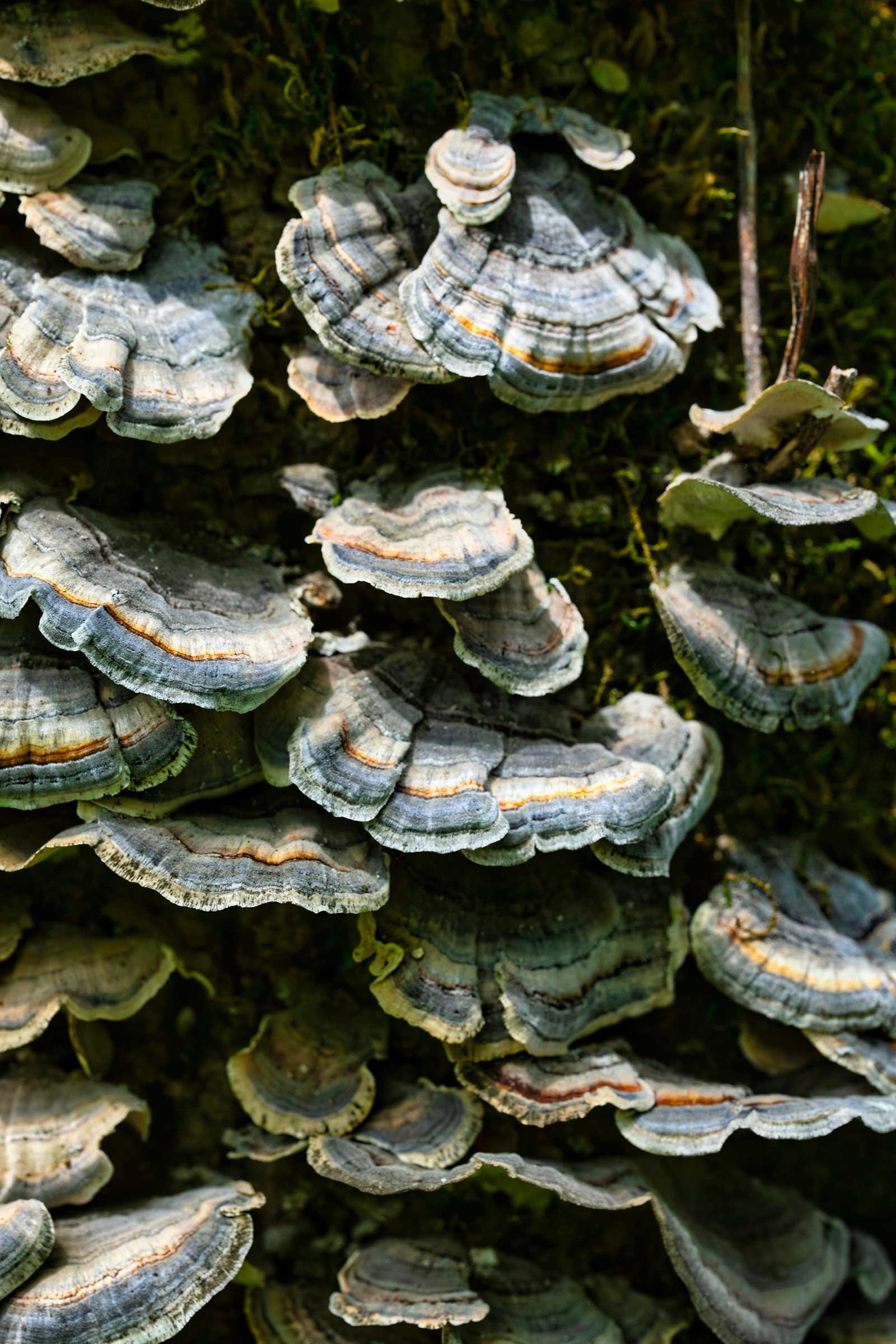Pretty & Plentiful

Trametes Versicolor Makes an Invigorating Immunity Tea
by Torrey Douglass
The trametes versicolor mushroom is found throughout the world and, as such, is known by many names. In Japan it’s referred to as kawaratake, meaning “mushroom by the riverbank.” In Holland it’s called elfenbankje, or “fairy bench.” The Chinese name is yuh chi, or rain cloud mushroom, and the German one is schmetterlingstramete, or butterfly tramete (tramete is a fungi genus). Here in the U.S., its common name is turkey tail, and they are lovely and abundant, with a host of health benefits that our beleaguered winter immune systems will appreciate.
The Latin name reflects the delicate beauty of turkey tails—trametes means “one who is thin” and versicolor means “multicolored.” They do what all mushrooms do—break down organic matter to make its nutrients available to other plant life. Found on decaying hardwoods a few weeks after a soaking rain, they are distinguished by stripes of earthy grey and brown colors rippling out to the edges. There are several look-alikes (none of them toxic), so be sure to check the underside for small white pores rather than fins.
In Chinese medicine, these mushrooms are used as an anti-inflammatory and to combat infection, benefiting respiratory, urinary, and digestive systems. They are believed to improve energy and stamina, increase circulation, and even prevent cancer and regulate cholesterol. Over 400 scientific studies in Japan over the past 30 years have demonstrated its benefits to cancer patients, improving their immune systems both in conjunction with and in the absence of chemotherapy.
When foraging for turkey tail, always leave a third of the body to disseminate the spores and yield more mushrooms for future foragers. After collecting the fruiting bodies, clean them carefully with a dry brush to remove dirt and any other forest debris. You can dry them at home in a dehydrator or spread out on a cookie sheet someplace warm and dry, covered by a screen. After they are dried, be sure to store them in a dark place inside an airtight container to preserve their nutrients. The dried mushrooms can be added to soups or heated at a gentle simmer to make tea. The result has a flavor reminiscent of mushroom soup, which can be balanced by adding some lemon and honey to perk up the taste. Follow the recipe below for a warming, zingy, immune-boosting tea that will support your system during the wet and chilly winter weather.
Winter Immunity Turkey Tail Tea
INGREDIENTS
¾ cup diced turkey tail, fresh or dried, well cleaned
2 tsp fresh ginger, diced fine
lemon juice to taste
honey to taste
INSTRUCTIONS
Put diced mushrooms and ginger in a saucepan and cover with water. Simmer gently for at least an hour and up to 2 hours, and monitor it carefully so it never boils vigorously. Pour through a fine sieve to remove the solids and add lemon juice and honey to taste.
Just because most people can consume turkey tail without any issues doesn’t mean you shouldn’t be careful. When you first try a new foraged food, ingest just a small amount and then wait for a day or two before consuming more.
Just because most people can consume turkey tail without any issues doesn’t mean you shouldn’t be careful. When you first try a new foraged food, ingest just a small amount and then wait for a day or two before consuming more.
Photo by Tom Fisk courtesy of pexels.com
